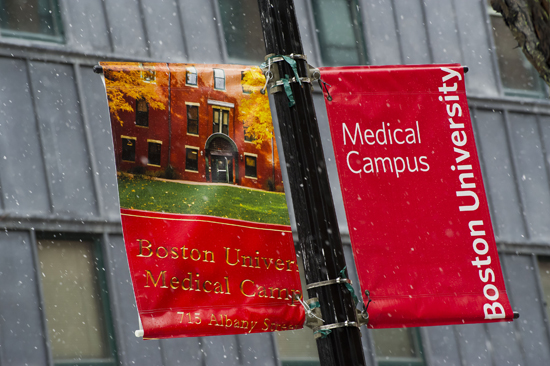Promotion to Full Professor for Four MED Faculty
Expertise in cancer treatment, PTSD, antibiotic resistance, blood transfusion

Their research runs the gamut from high-tech cancer-spotting to preventing domestic violence among veterans with post-traumatic stress disorder. And their expertise has earned them promotion to full professor on the faculty at BU’s School of Medicine. They are Gregory A. Grillone, Kalpana Gupta, Karen Quillen, and Casey Tyler Taft.
“We want to congratulate our very accomplished recently promoted professors,” says Karen Antman, dean of MED and Medical Campus provost. “These senior leaders are nationally and internationally recognized experts in their disciplines.”
Gregory A. Grillone, MED professor of otolaryngology
Grillone, vice chairman of the otolaryngology, head and neck surgery department, specializes in using spectroscopy for detection and treatment of cancer in the oral cavity and larynx. He has earned international recognition for his work on head and neck cancer screening and early detection in smokers and former smokers, and is involved in two NIH-funded studies, one as principal investigator and one as co–principal investigator. He is program director for the otolaryngology residency program and president of the American Bronchoesophagological Association. His peers have voted him one of the Best Doctors in America as well as one of America’s Best Doctors.
Foremost among Grillone’s several current research initiatives is one using spectroscopy to detect cancer in the oral cavity and larynx. “Spectroscopy is just a fancy way of saying, using light and how it absorbs and reflects off of tissues to be able to tell something about the tissue,” he says. He uses light to identify “satellite lesions under the surface…tissue that looks normal to the naked eye, but in fact is abnormal,” allowing doctors to adjust the margins of their work to be sure they remove all the cancer.
The project is a team effort with Irving Bigio, a College of Engineering professor of biomedical engineering and of electrical and computer engineering, and his Biomedical Optics Lab and others.
Kalpana Gupta, MED professor of medicine
Gupta is an expert on antibiotic resistance and its role in hospital-acquired infections, such as MRSA (Methicillin-resistant Staphylococcus aureus). She is chief of the Section of Infectious Diseases at VA Boston Healthcare System, West Roxbury campus, overseeing its HIV practice and its clinical infectious diseases, antibiotic stewardship, and infection prevention programs. She has served as chair of the International Clinical Practice Guideline for Treatment of Urinary Tract Infections in Women, which took more than four years to put together.
The project, she says, “was people sharing ideas and expert opinion, and also looking at the literature and analyzing it and interpreting it, and figuring out how to put it into a form that clinicians could use as a guide for treating UTI.” Gupta says completing the guideline was only a starting point for the long process of disseminating it nationally and internationally; the guideline will be updated in the next couple of years.
Karen Quillen, MED professor of pathology and laboratory medicine
Quillen is medical director of both the Blood Bank and the blood stem cell processing lab at Boston Medical Center. “That’s a big part of my job because the area is so heavily regulated,” she says. “Some of the clinical research projects get done on the side; I write manuscripts at night or on weekends. I imagine this is not unique to me.”
Her research focuses on improving transfusion safety for people who need repeated transfusions, notably sickle cell anemia patients. She collaborates with the University’s Center of Excellence in Sickle Cell Disease to determine why some patients become sensitized to donor red cells and other patients don’t. She has published extensively and has served on numerous national and international advisory panels, including the US Department of Health and Human Services Advisory Committee on Blood and Tissue Safety and Availability.
Last fall, Quillen cotaught an undergraduate seminar in the Kilachand Honors College based on Blood: An Epic History of Medicine and Commerce,” by Douglas Starr (COM’83), a College of Communication journalism professor. “It was my first venture into undergraduate teaching,” she says, “and it was a lot of fun.”
As a full professor, Quillen says, “I’ll continue doing what I do currently; I’m not going to change my clinical or research focus. But I might be more adventurous and explore other areas that BU is trying to emphasize, such as global health. Transfusion and treatment of blood diseases in developing countries is less advanced, and one of these days I might want to do some international work.”
Casey Tyler Taft, MED professor of psychiatry
Taft specializes in the investigation of violence in domestic relationships, with emphasis on post-traumatic stress disorder (PTSD) as both a risk factor for perpetration and as a consequence of victimization. He was the primary architect of the Strength at Home program, developed with colleagues to prevent and reduce domestic violence in military families. The program has just completed two large-scale clinical trials involving more than 500 people, veterans and their intimate partners, with promising results.
“Most men we see have some form of trauma,” often combat-related, says Taft, whose work is based at the VA Boston Healthcare System’s Jamaica Plain campus. “It’s group therapy, basically, trauma-focused.” The idea is to help veterans “manage their anger better, help them manage the situation better, and interpret other people’s intentions in a more positive light.” He and his partners are hoping to roll out the program at nine VA centers nationwide.
A staff member at the VA National Center for PTSD, Taft is principal investigator on active grants from the Department of Veterans Affairs, the Centers for Disease Control and Prevention, and the Department of Defense.
This BU Today story was written by Joel Brown. He can be reached at jbnbpt@bu.edu.